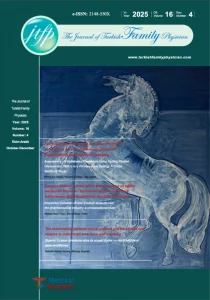Evaluation of MPV and PDW levels by using antihyperglycemic drugs in type 2 DM patients
Objectives: MPV and PDW are vascular complications markers and improved glycemic control levels are correlated those indicators in patients with type 2 Diabetes Mellitus. The aim of in this study, MPV and PDW levels were compared type 2 diabetic patients treated with oral antihyperglycemic agent and insulin.
Methods: This study was performed retrospectively on type 2 DM patients who were admitted to Ankara Atatürk Training and Research Hospital. 118 randomly selected patients were divided into 3 groups that were non-diabetic (Group 1), who received OAD therapy (Group 2), and those who received insulin therapy (Group 3). HbA1c, MPV, PDW levels were collected, analyzed and compared with each other.
Results: MPV and PDW values were increased in type 2 DM patients compared to the control group (Group 2; p <0.001 and Group 3 p <0.001, respectively). There was no statistically significant difference between MPV and PDW values in patients treated OAD and insulin therapy (p=0.736 ve p=0.360 respectively). A statistically significant positive correlation was found between HbA1c values and MPV (p <0.001) and PDW (p <0.001) values.
Conclusions: In our study, no significant difference was found between MPV and PDW values of patients using insulin and oad. Early initiation of conventional insulin therapy in patients with type 2 diabetes provides good glycemic control. Rational drug use in accordance with the guidelines; gains importance in treatment success. Skipping this factor may reduce the efficiency of other efforts in relation to rational treatment.
References
- Jabeen F, Fawwad A, Alvi F et al: Role of platelet indices, glycemic control and hs-CRP in pathogenesis of vascular complications in type-2 diabetic patients. Pak J Med Sci 2013; 29.1: 152-6.
- Şahpaz F, Kılınç F: Relationship between increased mean platelet volume and glycosylated hemoglobin (HbA1c) in type 2 diabetes mellitus. Çukurova Med J 2016; 41.1: 13-6.
- Kadić D, Hasić S, Spahić E: Mean platelet volume predicts the glycemic control deterioration in diabetes mellitus type 2 patients. Med Glas (Zenica) 2016;13.1: 1-7.
- Kaplan Efe F, Dönderici Ö, Keskin Demircan S, Yıldız P, Gülden F: Diyabet tanısı koymada açlık plazma glukoz ve oral glukoz tolerans testi esas alınarak HbA1c’nin değerlendirilmesi. Nobel Med 2014; 10(2): 39-43.
- Keskin Ö, Balcı B: Diabetes mellitus ve kardiyovasküler komplikasyonlar. Kafkas J Med Sci 2011; 1(2): 81-5.
- Kodiatte TA, Manikyam UK, Lakshmaiah V: Mean platelet volume in diabetes mellitus. Journal of Laboratory Physicians 2012; 4.1: 5-9.
- Vernekar PV, Vaidya KA: Comparison of mean platelet volume in type 2 ddiabetics on insulin therapy and on oral hypoglycaemic agents. Journal of Clinical and Diagnostic Research 2013; 7(12): 2839-40.
- Şahpaz F, Ulutaş K.T: İnsülin veya oral antidiyabetik ilaç alan tip 2 diyabetli hastalarda ortalama trombosit hacmi değerlendirilmesi. Dicle Med Journal 2015; 4 : 399-403.
- TEMD DM Eğitim ve Çalışma Grubu: Diabetes mellitus ve komplikasyonlarının tanı tedavi ve izlem klavuzu. TEMD 2019;12: 97-9.
- Çakmak R: Akılcı ilaç kullanımı. 17. Diyabet Günleri: Sunum slaytları. 31. Endokrinoloji ve Metabolizma Hastalıkları Mezuniyet Sonrası Eğitim Kursu, 2019.
- Yapıcı G, Balıkçı S, Uğur Ö. Birinci basamak sağlık kuruluşuna başvuranların ilaç kullanımı konusundaki tutum ve davranışları. Diclemedj 2011; 38(4): 458-65.
- Oktay Ş ve Kayaalp SO. Reçete yazma kuralları ve rasyonel ilaç kullanımı. “Rasyonel Tedavi Yönünden Tıbbi Farmakoloji” içinde. (ed)Kayaalp SO. 11. Baskı. Ankara, Hacettepe-Taş Kitabevi. 2005:130-142.
- Aydın B, Gelal A: Akılcı ilaç kullanımı: Yaygınlaştırılması ve tıp eğitiminin rolü. DEÜ Tıp Fakültesi Dergisi 2012; 26(4): 57-63.
- Gümüşsoy M, Bahşi R, Sürmeli DM ve ark: Yaşlılarda hatalı insülin kullanımı ve insülin eğitiminin etkisi. Van Tıp Derg 2018; 25(3): 323-31.
- Aslan Ü, Korkmaz M: Diyabetli bireylerin insülin uygulama bilgi-beceri düzeyleri: doğru ve yanlışlar. Dokuz Eylül Üniversitesi Hemşirelik Fakültesi Elektronik Dergisi 2015; 8(1): 18-26.



